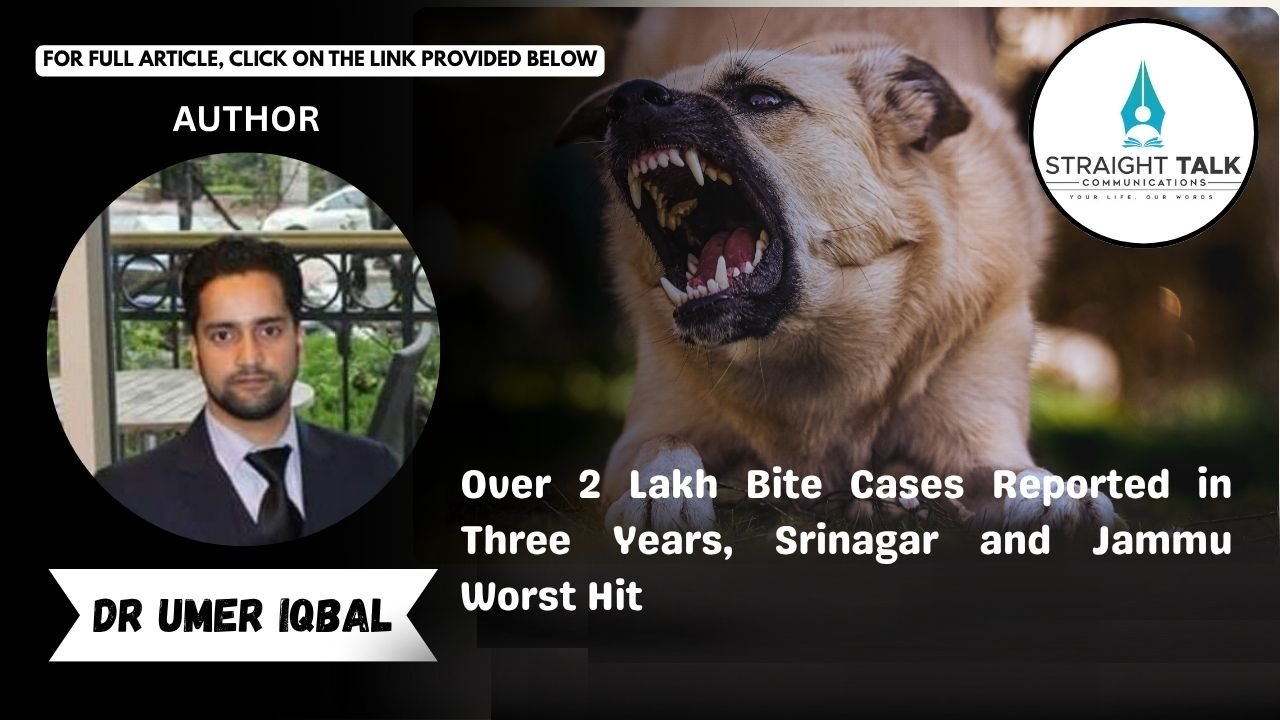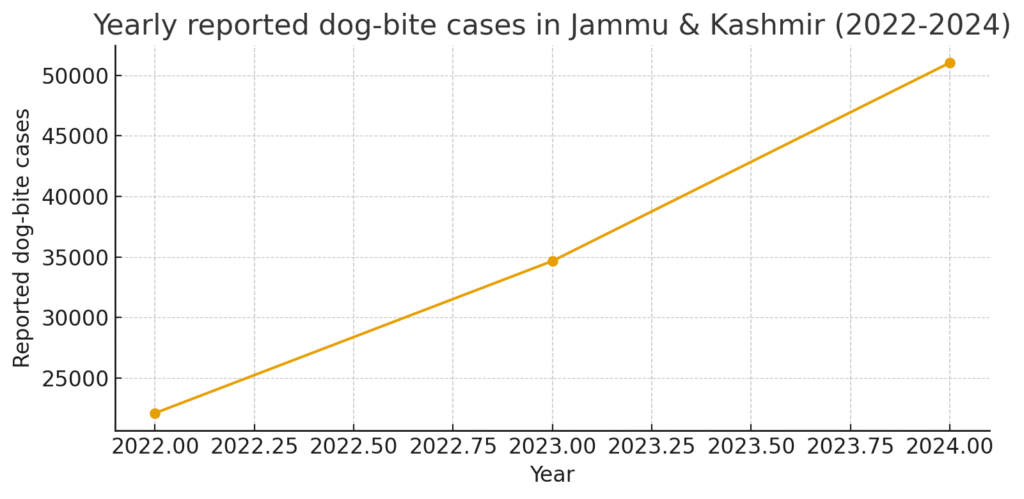Dog Menace Escalates in Jammu & Kashmir

Over 2 Lakh Bite Cases Reported in Three Years, Srinagar and Jammu Worst Hit

Dr Umer Iqbal
The Union Territory of Jammu & Kashmir is confronting a troubling surge in stray-dog attacks and associated health risks, underscored by recent government data and media reporting. Between 2022 and 2025, the region recorded 212,968 dog-bite cases, 98,470 in the Jammu division and 114,498 in the Kashmir division during that period. In 2022, the official count for the UT stood at 22,110 reported dog-bite cases. By 2023, this number had climbed to 34,664, and in 2024 it reached 51,027, with additional cases already reported in the first month of 2025. What this means in practical terms is that on average nearly 150 dog-bite cases are being reported each day across Jammu & Kashmir.
The district-wise breakdown highlights the scale of the challenge. In the Kashmir division, the city of Srinagar alone reported 36,406 cases between 2022 and 2025, the highest single‐district tally. In the Jammu region, the district of Jammu reported 54,889 cases in the same period.
Although human rabies deaths in the UT are reportedly low in recent years, the sheer number of bite incidents places a heavy burden on healthcare, civic services and public safety. For instance, at the Anti-Rabies Clinic (ARC) of SMHS Hospital in Srinagar, 6,258 dog-bite cases were logged between June 2024 and May 2025, more than 17 dog bites every single day at just one facility. Children, meanwhile, are disproportionately affected by stray-dog incidents, according to hospital data.
Beyond the trauma of the bite itself, the ripple effects include: delays in post-exposure prophylaxis (PEP), higher treatment costs, pressure on municipal infrastructure (sterilisation, vaccination drives), and growing fear among residents, particularly those walking to school or work.
There are several interlocking factors that are driving the surge. The growing population of un‐owned or stray dogs, especially in urban and peri-urban zones, creates more opportunities for human-dog contact. Waste-management lapses and open garbage increase food supply for stray dogs, raising their numbers and presence in public spaces. Sterilisation and vaccination campaigns under the Animal Birth Control Programme (ABC) and anti-rabies initiatives are ongoing but still lag behind the scale of the problem. For example, between June 2023 and September 2025 the Srinagar Municipal Corporation sterilised and vaccinated around 48,998 stray dogs. Fragmentation of responsibilities among municipal bodies, animal-husbandry departments, health services and NGOs hampers sustained coordination and rapid response.
When dog-bite cases climb into tens of thousands annually, the focus must shift from reactive treatment to preventive, systemic action. Each incident costs time, medical resources and puts lives at risk. More importantly, although no major human rabies outbreak has been officially reported in J&K of late, the disease remains nearly always fatal once symptoms manifest meaning that even a single missed or delayed PEP can have dire consequences.
Managing this crisis effectively demands a multi-pronged approach: expanding and sustaining ABC & vaccination drives; upgrading waste-management systems to reduce stray-dog food sources; improving health-pathways for victims of dog bites (including better availability of vaccine and immunoglobulin); and cultivating public awareness around safe interactions with street dogs and prompt PEP after any bite. Given the regional data, district-wise targeting of hotspots (such as Srinagar and Jammu) will yield more impact than blanket policies alone.
The numbers from Jammu & Kashmir depict more than just a rise in stray dog populations, they reflect an escalating public-health challenge that demands urgent attention. With over 2 lakh dog-bite cases reported in just a few years, the situation is now firmly in the domain of major civic priority, not peripheral concern. Addressing it will mean sustained funding, inter-departmental collaboration, community engagement and above all, the political will to act ahead of the next escalation.
Dr Umer Iqbal is editor at Straight Talk Communications. He can be mailed at: editor@straight-talk-







